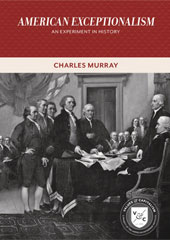The End of American Exceptionalism?
America, on the road to become like Europe’s social democracies, is losing its exceptionalism.
April 24, 2014

For many Americans, the phrase “American exceptionalism” has become another way of saying “America is number one.” For many Europeans, American exceptionalism is an example of the American chauvinism that they have always found so irritating.
Meanwhile, the historical reality of American exceptionalism is ignored. First and foremost, American exceptionalism is not about American superiority, but about unique aspects of America in the first century and a half of its existence.
How the United States differs from Europe
America differed first in its setting, buffered from Europe by the Atlantic Ocean and having a frontier – space for people to spread out, to make a new start, to seek their fortune – that was unknown in Europe.
America’s isolation decisively affected its foreign policy. Its frontier decisively affected the development the “rugged individualism” that marked Americans relationship to their government.
America also differed in its ideology. The narrow limits that the U.S. constitution put on the powers of government had no counterpart elsewhere in the world, not even in its closest cousin, Britain. Those limits were founded on a belief in the ability of ordinary people to make their own decisions and live their own lives.
America differed in its civic culture as well. Four American traits central to that culture are:
■ egalitarianism (the classes mixed with each other in America as they did nowhere else)
■ industriousness (no other American quality was so consistently seen as exceptional by foreign observers as Americans’ unremitting hard work as a means of getting ahead)
■ religiosity (European elites had become formalistically religious, not passionately so as in America), and
■ the nature of community life (widespread voluntary mutual assistance among people who happen to live near each other has been rare outside America).
America finally differed in its politics – the difference that has preoccupied most academic writers on American exceptionalism, and a difference that needs a longer description.
From liberalism to social democracy
The history of politics in Western Europe is an evolution from 19th century liberalism to social democracy. Liberals of the 19th centuries advocated laissez-faire economics and limited government under democratic rule. They were an important force in many European countries – dominant in Britain – for most of the 19th century.
Starting around the 1830s and accelerating in the 1840s, Western European nations saw the growth of workers’ movements. They usually began as demands for the vote, improved working conditions as well as the right to unionize.
Workers’ movements then adopted the socialist framework. It had been first developed by French thinkers and brought to maturity by Karl Marx and Friedrich Engels.
A tangled history ensued in which socialism and communism eventually triumphed in Russia – but not in Western Europe. Instead of either socialism or communism, the countries of Western Europe developed an ideological mix of socialist and capitalist thought that became known as “social democracy.”
By the 1950s, social democratic parties were either the dominant or one of the two most dominant parties in a wide range of European countries. The list includes the United Kingdom, Scandinavia, the Low Countries, Germany, Austria and France. It eventually extended to Greece, Italy, Spain and Portugal as well.
Social democracy – not the American way
Social democracy is the ideology of the advanced welfare state. It consists of a combination of democratically selected representatives, extensive state regulation and cradle-to-grave government programs intended to increase economic equality and buffer citizens from the ups-and-downs of the economic cycle.
Ultimately, the political success of social democracy in the 20th century is owed to the development back in the 19th century of major political parties that were rooted in working-class issues – and thus able to attract specific, class-conscious support among members of the working class.
And therein lies another aspect of American exceptionalism: the United States, uniquely among the countries of the West, never developed a strong working-class party.
America’s peculiar unions
It wasn’t that American workers didn’t organize. They did, forming an active union movement from the 1820s onward. It became powerful in the last part of the 19th century and continued to gain strength through the first half of the 20th century.
However, the most famous U.S. union leader, Samuel Gompers, and the union he led for 40 years, the American Federation of Labor, were militantly in favor of more union power – but not more state power.
Gompers himself was vocally anti-socialist. Until the 1930s, long after working-class movements had become ascendant in Europe, American unionism and the political movements in the country stood out for one fact: They remained remarkably divorced from one another.
The reasons why America failed to follow either the predictions of Marxism or the experience of Europe have been analyzed in an extensive literature. The converging point of agreement is that Americans did not see themselves as members of classes and did not think they were being held back by forces beyond their control.
And so the concept of class-consciousness never took hold here – something that Marx and Engels themselves eventually acknowledged about America. Whatever the reasons, the simple fact that America never developed a workers’ party is seen by many scholars of the left as the most striking aspect of American exceptionalism.
Exceptionalism today
America is still exceptional today, but a lot less than it used to be.
America’s setting is no longer at all exceptional. The oceans no longer buffer America from the world, and the frontier was gone before the end of the 19th century.
America’s ideology is a shadow of its original version. Americans still pay lip service to freedom, but limits on the power of the federal government were effectively repealed in the 1930s and early 1940s, through the reinterpretation of some key clauses of the constitution.
The distinctive American traits that underwrote America’s civic culture have all deteriorated. On quantitative measures, Americans are still somewhat more egalitarian, industrious, religious and neighborly than Western Europeans.
But but the contrasts have shrunk over the last century, with Americans moving toward the European norms. Civic engagement and social trust have eroded accordingly.
A different political style
America politics remain exceptional insofar as America still does not have a major political party with a working-class base. The Democratic Party, once America’s closest approximation to a labor party, has actually become less identified with labor as it has moved left on social issues that alienated a socially conservative working class.
American political rhetoric remains exceptional. Mainstream American conservatives have been much more committed to free-market economics and traditional values regarding family and religion than are mainstream European conservatives.
Mainstream liberals, for their part, have framed their objectives in distinctively American ways. They avoid the language of class warfare and emphasize traditional American themes of opportunity and upward mobility.
In terms of governing agendas, the distinctions between America’s and Europe’s politics have blurred.
Republican presidents from Dwight Eisenhower through George W. Bush, with the single exception of Ronald Reagan, governed in ways that are similar to those of Europe’s center-right leaders. Democratic presidents since Franklin Roosevelt have advocated policies that are generically similar to those of a European social democratic party.
The end of American exceptionalism?
America still has exceptional aspects, but it is no longer the unique outlier that amused, amazed and bemused the rest of the world from its founding through the first half of the 20th century.
Americans have a history of confounding people who try to predict what they will do next, but the best bet is that America’s governing regime will be close to indistinguishable from those of advanced social democracies within a few decades. The demise of the remaining aspects of American exceptionalism is unlikely to be far behind.
This essay is adapted from “American Exceptionalism, An Experiment in History,” by Charles Murray, 2013, The American Enterprise Institute for Public Policy Research, Washington, DC, and Rowman & Littlefield Publishing Group, Lanham, Maryland.
Takeaways
America still does not have a major political party with a working-class base.
America's governance will be close to indistinguishable from advanced social democracies within a few decades.
The United States uniquely among the countries of the West never developed a strong working-class party.
In the US, unionism and political movements remained remarkably divorced from one another.
Exceptional no longer? Americans are moving toward the European norms.
For Europeans, "American exceptionalism" is an American chauvinism they have always found irritating.
American exceptionalism is not really about superiority but about unique circumstances.
Read previous

Don’t Reverse Globalization. Refine It.
April 22, 2014
